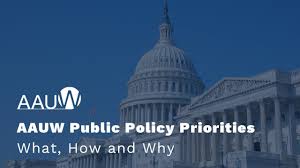AAUW Public Policy Principles & Priorities 2025-2027
Adopted May 2025 AAUW’s Public Policy Principles
 AAUW’s mission to advance gender equity through research, education, and advocacy is grounded in these bold principles:
AAUW’s mission to advance gender equity through research, education, and advocacy is grounded in these bold principles:
AAUW opposes all forms of discrimination on the basis of age, disability, race, ethnicity, sex, gender, sexual orientation, gender identity, geographical location, national origin, religious beliefs, pregnancy or parental status, or socioeconomic status, and supports constitutional protection for the civil rights of all individuals.
We Stand for Education
- Higher Education: Support affordable, inclusive higher education that yields high-quality credentials or degrees; reduce barriers to completion; and address the student debt burden, especially for women and borrowers of color.
- Public Education: Invest in strong public K–12 systems and oppose the use of public funds for nonpublic schools.
- Inclusive Curriculum: Ensure curricula are accurate, science-based, and free from censorship or bias.
- STEM Opportunities: Close the gender gap in STEM and expand access to vocational and technical training.
- Strengthened Civil Rights Protections: Support safe, harassment-free learning environments by strengthening and enforcing protections to prohibit discrimination based on sex, race, and disability.
We Stand for Economic Security
- Pay Equity: Ensure equal pay for work of equal value through salary transparency, fair wage laws, and anti-discrimination enforcement.
- Support for Caregivers: Expand access to paid sick and family leave, and affordable child and elder care.
- Retirement Security: Protect and strengthen Social Security, Medicare, and Medicaid.
- Reproductive Freedom: Ensure access to contraception and abortion care.
We Stand for Social Justice and Civil Rights
- Constitutional Rights: Vigorously enforce civil rights, including recognition and publication of the Equal Rights Amendment, and improve disaggregated data collection.
- Expanding Voting Rights: Promote equitable political participation and ensure all Americans have full access and the right to vote.
- Freedom from Harassment and Violence: Guarantee legal protections from harassment and gender-based violence, and support efforts to combat human trafficking and reauthorize the Violence Against Women Act.
- International & Civil Rights: Support U.S. advancement toward gender equity in education and the economy through the Beijing Declaration and Platform for Action and ratification of CEDAW.
AAUW’s 2025–2027 Federal Action Priorities
To support equitable access to higher education—and to reduce the barriers that hinder women’s advancement, especially women of color—AAUW advocates for:
- Reinstating Title IX rules that strengthen and clarify protections for student survivors of sexual harassment and assault, ensure accommodations for pregnant and parenting students, and affirm protections based on sexual orientation and gender identity.
- Defending inclusive education from attacks on diversity, equity, and inclusion.
- Reducing barriers to postsecondary success, including increased financial support and manageable student debt.
- Addressing non-tuition barriers such as paid leave, childcare, and access to contraception, and abortion care.
Our branch and state AAUW advocacy will focus on issues using these newly adopted public policy principles and priorities.
Georgia Kimmel, Public Policy Chair
